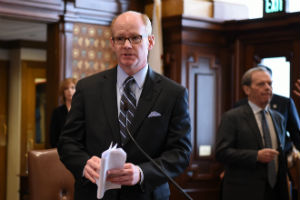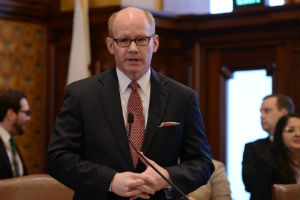- Details
- Category: News
SPRINGFIELD – State Senator Don Harmon (D-Oak Park) joined colleagues and Gov. JB Pritzker today to announce the passage of a proposed constitutional amendment allowing for a fair tax and the creation of a property tax relief task force.
“We have taken a major step today toward providing our state two things it desperately needs: long-term stability and tax relief for middle-class and working families,” said Harmon, the sponsor of the proposed amendment. “By finally starting the process to reform our regressive tax system and simultaneously holding conversations about property tax relief, I know that we are building a better future for Illinois.”
The proposed Constitutional amendment would remove language requiring a flat tax and allow the General Assembly to set lower rates for those making less and higher rates for the wealthiest Illinoisans.
Illinois is one of only nine states in the country to impose a flat tax. Harmon has worked to implement a fair tax for nearly 10 years, saying the state needs more flexibility in its tax structure.
The question of whether to amend the Constitution will now be placed on the ballot in November 2020. It will take effect if 60 percent of voters approve it.
- Details
- Category: News
SPRINGFIELD – After a decade of work to update Illinois’ outdated tax structure, Senator Don Harmon (D-Oak Park) today earned Senate approval of a constitutional amendment that would allow for a fair tax.
The proposed constitutional amendment would remove language requiring a flat tax and allow the General Assembly to set lower rates for those making less and higher rates for those earning the most.
“We’ve had the same tax structure in our state for nearly 50 years,” Harmon said. “Middle-class and working Illinoisans have been hurt by our inability to modernize our tax structure to reflect a changing economy.”
The proposed amendment does not include specific tax rates, but, under legislation sponsored by Senator Toi Hutchinson (D-Chicago Heights), 97 percent of Illinoisans would get tax relief. Hutchinson’s measure only takes effect if voters approve the constitutional amendment.
“We’ve made great progress in putting our state back on a path to stability after years of chaos,” Harmon said. “We still have work to do, and the only options we have besides the fair tax are to raise taxes dramatically on everyone or enact deep, punishing cuts to state services.”
If the amendment passes both the Senate and the House with a supermajority vote, it will be placed as a question on the November 2020 ballot. The Constitution will be amended if 60% of those voting on the question approve it.
Senate Joint Resolution Constitutional Amendment 1 now heads to the House for consideration.

- Details
- Category: News
Yesterday we welcomed guests at the Capitol for Illinois Muslim Action Day. Young people from across the state came to advocate for important issues for and beyond their community, and to learn about being involved in government policy. This annual event is organized by the Council of Islamic Organizations of Chicago (CIOGC). I was happy to meet Ahmad Raza from Addison, Illinois who is a junior at Islamic Foundation School.
Ahmad hold leadership positions in various clubs at his school and spends his free time working as a tutor at Kumon Learning Center and volunteering at DuPage PADS and Northern Illinois Food Bank. He plans to attend medical school to get a PhD in psychology and become a psychiatrist or psychologist.

- Details
- Category: News
 SPRINGFIELD – State Senator Don Harmon (D-Oak Park) advanced legislation today that would set a statewide standard for alcohol delivery from retailers.
SPRINGFIELD – State Senator Don Harmon (D-Oak Park) advanced legislation today that would set a statewide standard for alcohol delivery from retailers.
Senate Bill 54 would allow grocery stores and other licensed retailers to alcohol to the homes of consumers if certain conditions, including age verification and training, are met.
“More and more people are ordering their groceries online,” Harmon said. “We want to keep up with this modern way of shopping and make sure that any retailers who want to provide this service to their customers are confident that they will be able to deliver anywhere in the state.”
Harmon said he is continuing to meet with working groups to finalize the legislation as it is considered in the House.
Senate Bill 54 passed the Senate without opposition and heads to the House.
- Details
- Category: News
 SPRINGFIELD – Illinois is one step closer to amending its Constitution to allow for a fair tax after Senator Don Harmon (D-Oak Park) passed a Constitutional amendment out of committee today.
SPRINGFIELD – Illinois is one step closer to amending its Constitution to allow for a fair tax after Senator Don Harmon (D-Oak Park) passed a Constitutional amendment out of committee today.
The proposed Constitutional amendment would remove language requiring a flat tax and allow the General Assembly to set lower rates for those making less and higher rates for the wealthiest Illinoisans.
“Our current tax system is punitive to middle class and working families in Illinois because it imposes a greater burden on them than on the wealthiest in our state,” Harmon said. “With a fair tax, we are simply asking top earners to pay their fair share.”
Illinois is one of only nine states in the country to impose a flat tax. Harmon has worked to implement a fair tax for nearly 10 years, saying the state needs more flexibility in its tax structure.
“We have no nimbleness in our tax policy,” Harmon said. “A flat tax gives us little ability to respond appropriately to an economic downturn. Our current system is antiquated, and a majority of Illinoisans have indicated that they want to change it. We need to give them the opportunity to take this vote.”
The proposed amendment does not include specific tax rates, but Harmon said legislation to set rates will be introduced later this legislative session. Gov. JB Pritzker announced proposed rates earlier this year that would raise an estimated $3.4 billion in revenue by raising taxes on only the top 3 percent of earners in Illinois.
“The only other options we have to balance our budget are to raise taxes dramatically on everyone or make deep, draconian cuts to vital state services,” Harmon said. “A fair tax will not only help us fix our state’s finances but also give us long-term stability.”
If the amendment passes both the Senate and the House with a supermajority vote, it will be placed as a question on the November 2020 ballot.
Senate Joint Resolution Constitutional Amendment 1 passed the Senate Executive Committee 12-5 today and now heads to the Senate for consideration.




